Forging a path
First-generation students, faculty and alumni reflect on their college experiences
Posted on: November 5, 2019; Updated on: November 5, 2019
For some students, the path to college is set when they are children. Their parents went to college; they will go, too. But that expectation isn’t the case for everyone. In South Carolina, where 35.6 percent of adults have a college degree (compared to 38.5 percent nationally), many students come from homes where their parents are not college graduates.
Nearly 18 percent of the undergraduate population at the University of South Carolina in Columbia identified themselves as being first-generation college students in 2018-19. That means their parents did not earn a four-year college degree. As those students navigate the college experience, they bring a wide range of backgrounds and perspectives to campus.
“A diverse student population enriches the institution’s environment for all: students, faculty and staff alike,” says Althea Counts, director of the university’s TRIO programs, a network of programs and services that support low-income and first-generation college students.
There is little debate that a college education is transformative, offering students pathways to a fuller life, a bigger paycheck and a rewarding career. But that transformation doesn’t always come easily: Nationwide, only 27 percent of first-generation students earn their degree in four years. That’s part of what TRIO does — helps students finish what they started.
We spoke to two undergraduates, two alumni and two faculty members who were first-generation college students at the University of South Carolina to learn about their experiences on campus and beyond. Here's what they had to say, in their own words.
Darieon McFadden, first-generation student
Darieon McFadden is a junior majoring in cardiovascular technology and a member of the Galen Health Fellows Program.
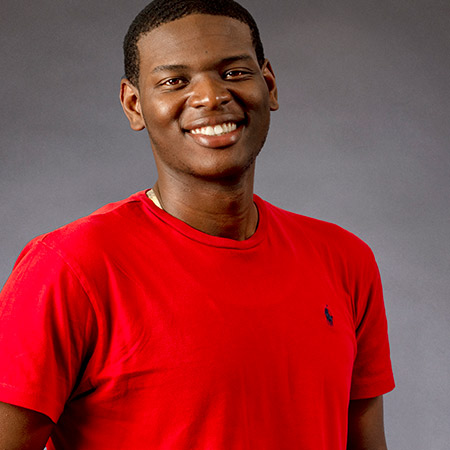
Initially, I wasn’t sure about going to college. I thought I was going to join the military. My mother begged me to go to college because no one in my family had been to a four-year university, but I didn’t really want to go. I considered a few places, but something in my heart was telling me the University of South Carolina was the place even though I had never actually seen the campus. I remember thinking, ‘This could be hit or miss.’ But it turned out to be one of the best decisions I’ve made, and if I had to do it over I would do it again.
I’m from Cades, a very small town in Williamsburg County, and before I came to Carolina, I had been to Columbia maybe three times and didn’t understand how big the campus is and how big Columbia is. When we had First Night Carolina down at the Strom [Thurmond Wellness and Fitness Center] my freshman year, I didn’t know how to get back to my dorm. It’s not that far, but I got lost. I had to use the GPS on my phone to find my way back to Patterson Hall.
I started as a biochemistry major, but I realized how much math was involved and went to my adviser and said, “I don’t think I’m going to be able to graduate if I stay in this.” My adviser told me about cardiovascular technology, and I realized all of the courses I had taken would align with it, plus I want to become a cardiologist. A lot of my motivation for wanting to become a cardiologist is because so many of my family members have some form of heart disease. My grandmother’s diagnosis was hard for me, and I want to spare others the pain we went through.
The Galen Health Fellows Program has been a gateway to everything I’ve done here: the organizations I’ve joined and getting an internship this past summer at the Medical Experience Academy [in Greenville]. It’s a workshop for undergraduates who want to attend medical school. I’ve also started doing faculty-mentored research on vaping.
I’m the vice president for BONDS (Brothers of Nubian Descent), a multicultural organization that mentors freshmen. One of the things I tell them at the beginning of the school year is that this is a big place, and you might be completely lost for a month. But after that you’ll find your way, just like I did.
Karen Worthy, first-generation faculty
Karen Worthy has five degrees from the University of South Carolina, including an associate’s degree in nursing and a bachelor of science in nursing from USC Upstate, plus a master’s of science in nursing, a master’s in public health and a doctorate in education from the university’s Columbia campus. Worthy is clinical assistant professor and interim assistant dean for undergraduate education at the College of Nursing.
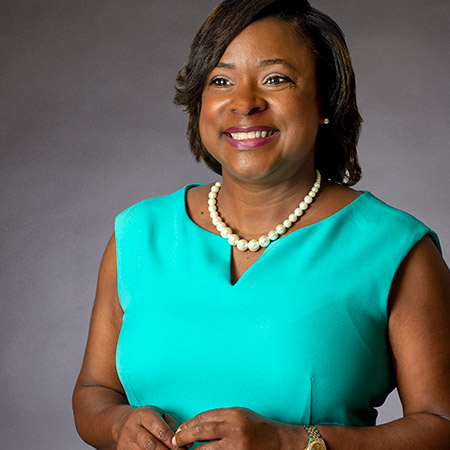
I have one child, a daughter. I was a teenage mom, a South Carolina teen pregnancy statistic. But because of my parents, I was afforded the ability to go to school. They were sharecroppers — in cotton production, in Chester, S.C., so a very rural area — but they never allowed me to think that I wouldn’t graduate from college. I was going to school regardless of the situation.
My parents had less formal education than most, but they are by far the smartest people that I know. They encouraged and motivated their children to do things they never had the opportunity to do themselves. Because of their love for education, I knew beyond a shadow of a doubt that me and my brothers and sisters were going to college, or had a career plan. And they helped me raise my child.
My daughter is now an OB/GYN — she did her residency at Duke — and a couple of years ago I heard her give a speech. She said, “You know, I never remember my mom not being in school. All my life she was emphasizing the importance of education.” To instill that in her, and to be able to instill that in my students, who may be in a similar situation to the one I was in as a teenage mom — to be that mentor and coach and motivator — that is just as important to me as it was to my parents.
So, when students encounter obstacles, and they think it’s just the end of the world, they know that they can come in my office, have a piece of chocolate if they want, and just talk. We can figure out a strategy. Sometimes they just need to own their situation. I’m tough on them, but it’s about pushing them to be a better student and, one day, a better nurse.
And the challenges typically aren’t as big as students think they are — because we do have resources to help. They just don’t know it. They don’t know those resources exist or they don’t know how to access them. Our students are very bright, though, so helping them find those resources makes a big difference.
Davontae Singleton, first-generation alumnus
Davontae Singleton is a sixth-grade teacher and co-chair of the English department at E.L. Wright Middle School in Columbia’s Richland District 2. He earned his bachelor’s and master’s degrees from UofSC.
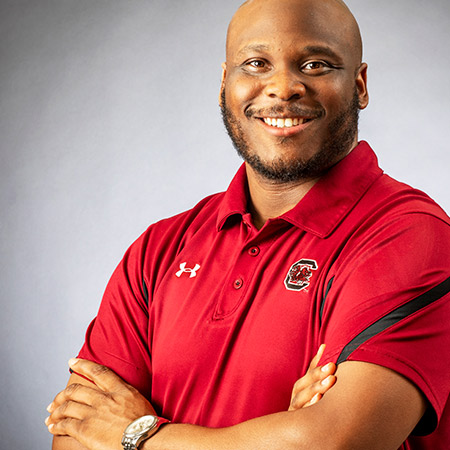
Growing up, it was never a matter of, ‘Are you going to college?’ It was, ‘Where are you going to go?’ It was an expectation. My parents told us that they didn’t get the opportunity to go to college, and they certainly didn’t want us to blow it.
My parents enrolled us in multiple programs, including the Gear Up program in middle school, so I had an experience unlike many other first-gen students because I was exposed to college. My parents made sure I had all the tools I needed. When it came time for me to apply, I knew exactly what I needed to do.
I was actually hesitant on whether or not I was going to be able to afford the University of South Carolina. It was my mom and my dad, and I have a twin sister and an older brother. I knew that when we both graduated, it was going to be difficult trying to figure out how my parents were going to be able to make sure my sister and I were able to afford going to school at the same time.
What really got me invested in USC was when I was accepted to be part of the Opportunity Scholars Program funded through TRIO. They made sure I was able to afford school and not really worry about finances. After my freshman year, my mom passed away. So then I was trying to maneuver and figure out how I was going to afford school while also making sure my family had everything we needed. That proved to be challenging, so having the financial stability aspect really helped ensure that I didn’t have to worry about how I was going to eat or how I was going to pay my school bills and tuition.
That’s what led me down the path to take on a mentoring role while I worked with the Opportunity Scholars and our Upward Bound program. I started as a tutor in ELA for high school students in Upward Bound. Somebody helped me get to where I needed to be, so I wanted to return the favor.
I started off as a political science major. I had every intention of going to law school, except I never really wanted to go to law school. My family wanted me to go to law school. From a very early age they told me, ‘You’d make a great lawyer.’ So like every young child you take on that persona. I got there and realized I hated sitting in my political science classes. I walked out of class one day and said, ‘This is not what I want to do.’ I called my parents. They had always known that education was something I was passionate about.
I changed my major to English. And ever since then I haven’t stopped going. I went through four years at South Carolina, graduated and went directly to the MT program, where I graduated in 2016. I’ve been teaching sixth-grade ELA since then.
I had strong mentors and people that pushed me, that helped me get to where I am today. I’m still in contact with many of those people at the university, like TRIO director Althea Counts. She is still instrumental in my life and I graduated five years ago. She still calls on me and checks on me. She said, ‘I know you said years ago you were thinking about that doctorate, and time’s a ticking.’ So here I am applying for doctoral programs. It’s important to have that person or group of people who still challenge you to be the absolute best you can. It’s because of those connections that I do what I do every day and try to do the exact same thing for my students.
I don’t think I’d be where I am if hadn’t gone to the University of South Carolina. I tell people all the time, it’s going to sound cliché, but it’s the truth. Live without regret. Do things you wouldn’t normally do. I never expected to study abroad while I was at the university. I was able to go abroad twice. I was able to do research, I was able to present at symposiums. And I was able to study the things I’m interested in.
Hannah S. Parkin, first-generation student
Hannah S. Parkin is a senior majoring in geography in the College of Arts and Sciences and an Air Force ROTC cadet.
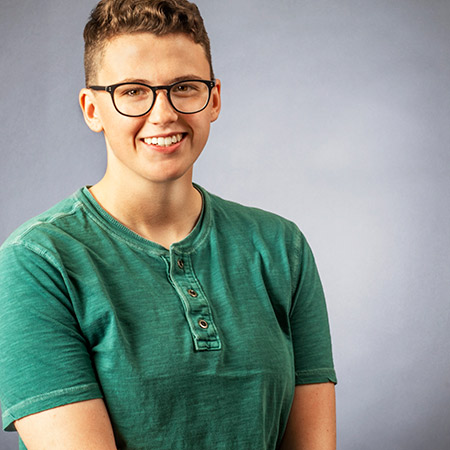
I’m from West Springfield, Massachusetts. I did well in high school, but I wasn’t really sold on the idea of college because it was a very new thing for me. I didn’t have anybody pointing me in the right direction as far as what I was looking for, where I needed to go or how to go about it.
I was interested in the military because it seemed like the safer option. My family was military. They could guide me as far as what that would look like, but with college I didn’t have quite as much guidance.
I initially looked at Smith College in Northampton (Mass.) because they had a good reputation in Massachusetts. My parents told me before I graduated from high school that they were planning to move to South Carolina, so I started looking at schools down here because it was the more financially responsible decision to go to a public or state university instead of a private university in Massachusetts.
I applied to four schools down here before I’d even seen them. After I got accepted to all of them, I decided to go look at them. It wasn’t until April of senior year that I looked at the colleges. In May, I committed to South Carolina.
South Carolina was the closest school that gave me the best scholarship. So at the end of the day it was going to be the least expensive option. That’s what I was going for because I was funding this all on my own.
I got the Flinn scholarship from the university. That reduced my tuition enough where I could afford to pay it.
As a freshman, I remember being very overwhelmed. I think that’s the same for all college students. After a semester I settled in. I didn’t notice any difference between first-generation kids and kids who had doctors as parents; I had no idea about any of that. I made my way and by the end of freshman year I was good to go, all settled in and I had changed my major to geography.
I ended up going the military route anyway. My funds ran out really quick. I didn’t realize how expensive college living was. I needed to secure some other way to pay for college and I looked into ROTC and I saw that scholarships were available. I decided to give it a try since it was something I was interested in anyway. My sophomore year I joined ROTC. Within my first half of a semester in the program, the commander awarded me a scholarship. I’ve been with the program ever since. I am contracted and I will be commissioning in May as a second lieutenant in the Air Force.
I’ve enjoyed my time at South Carolina. There have been a lot of challenges. My classes have been good. I’ve met some outstanding professors, especially in the geography department. Many of them have taken on the mentor role for me, guiding me through classes and getting research and other experiences. So it’s been a positive experience. I’ve taken so much more out of it than just academics. I’ve learned so many lessons through ROTC as far as discipline and how to interact with other students, how to teach them and how to be a mentor to them.
In February of this year I found out I’m going to be a combat systems officer, that’s like a navigator or weapon systems operator in an aircraft. Typically the first base is at Pensacola, Florida. I’m committed to six years serving after I complete my training. I’m not planning on making it a career, but if I really enjoy it I’m open to that.
Salandra Bowman, first-generation alumna
Salandra Bowman is a native of Greenwood, South Carolina, who earned her bachelor’s degree in English and African American Studies. She is the director of training and research in the education division of South Carolina Educational Television. She also teaches in African American Studies and is working on her doctorate in Educational Foundations and Inquiry at UofSC.
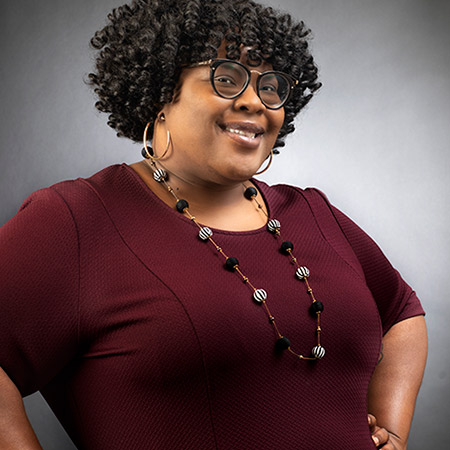
I am a first-generation student from a under-resourced community, rich in love. My mom was a single parent who required that I did well in school, but I also enjoyed the academic work. I had dreams of leaving Greenwood and I felt like college was the next step to do that.
When I was applying for college, I wasn’t necessarily aware of what college life would be like. I did not have a whole lot of information about the cost of college; I just knew I needed to get scholarships to be able to afford it.
I received a few local scholarships, some need-based and some merit-based. When I got an invitation to participate in the Opportunity Scholars Program, that was confirmation that USC was the place for me.
Initially I came in as an undecided major. I thought maybe French would be my major because I’d taken so much of it in high school. I didn’t know much about majors. My OSP adviser suggested that I take a course in African American Studies. I fell in love with the course work and found another home at USC among the faculty and fellow students enrolled in those courses. I was learning things I had not learned but was very curious about as a high school student. I remember asking my high school teachers, ‘Are we going to read something about black folks?’ Being in courses that were centered around African American experiences in celebratory ways was something I hadn’t experienced in the classroom before, so I was drawn to it. I ended up studying English and African American Studies.
As an Opportunity Scholars Program student, I was introduced to cultural activities and made lasting friendships. I was tutored and later became a tutor in the TRIO lab. TRIO is family, and the support of my TRIO family has impacted the trajectory of my life. (After graduation), I came back to work as a coordinator in the department. I was accepted into my master’s program at the Ohio State University and am a current doctoral student at USC because of my participation in the Ronald E. McNair Program.
Currently, I serve as the director of training and research in SCETV’s education division. I enjoy promoting lifelong learning and drawing from my experiences to support South Carolina’s educators and students. As a first-generation student I am committed to access and equity, so I really get excited about providing resources in rural and under resourced communities in South Carolina. I’m trying to do my part to make life better for those coming after me. The craziest thing is I didn’t major in education, but I never left.
As a core value, I think that it is important to say thank you and say the names of our heroes. There are USC faculty and staff, former and current, who supported me as a student and continue to reach back and mentor me as an adult. People like Althea Counts, Stephanie Frazier, Hope Rivers, Bobby Donaldson, Qiana Whitted. Whether it was their teaching or advising, helping me learn to be a better qualitative researcher, considering me for opportunities, or telling me when they see me acting in ways that are not advantageous to my life’s trajectory, they have certainly been pivotal influences in my life. I am champions of theirs because they are champions of me.
Sandra Kelly, first-generation faculty
Sandra Kelly has been a faculty member at the University of South Carolina since 1988 and has served as chair of the Faculty Senate and associate dean of the Honors College. She is currently vice provost and dean of undergraduate studies.
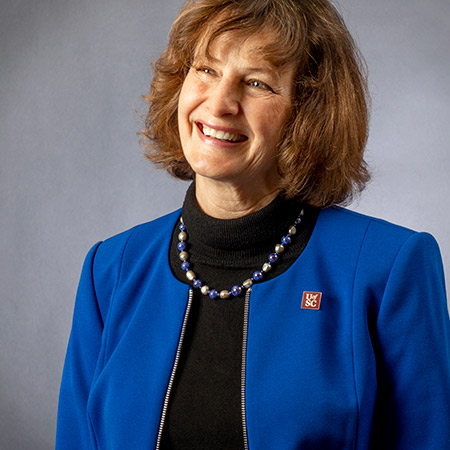
I grew up as the only girl among five children, and my parents were adamant that we would all go to college because it was the ticket out.
They highly valued education, but neither of them had a degree. Dad ran a bookkeeping firm; his parents were immigrants from Lebanon. My mom did a six-month professional training course after dropping out of school after grade 11. They didn’t understand anything about university but at the same time, they were like, “You will go.”
I was ready to go and also didn’t think anyone had anything to tell me about how to do it. When I look back, I made some pretty big mistakes as a college freshman, and the fact that I ended up with a Ph.D. is pretty amazing. I had a work ethic and parental expectations that I would succeed. But on my first psychology test I got an F. I had no idea how to study, no idea that I should be reading the textbook.
I’d grown up in Sault Ste. Marie, Ontario, and went to McMaster University, about eight hours south. I insisted I was way too independent to go into a residence hall, so I lived on my own my first year. I had an OK time — it’s not like I was miserable or depressed — but I had to work harder to make friends. I didn’t engage in anything. I did my classes, which is all I thought I was supposed to do, and I know now that this is a really common attitude among first-generation students.
The big turning point for me was my last year of undergraduate school; I got a scholarship that allowed me to be a TA as a senior for Psychology 101. I thought it was going to be awful, talking in front of students. But I discovered I actually liked it. It was a whole new area of discovery for me to find out how fun teaching was.
I applied to graduate school to do experimental psychology with an emphasis on the biological aspects without ever having entered a lab as an undergraduate. I could have done research toward the end of my undergraduate career, but I couldn’t work up enough nerve to go talk to a faculty member. It wasn’t the smartest thing I’ve ever done — applying to a graduate program without even knowing much about it, but it turned out that I loved it.
I still remember the exhale from my dad when I told my parents I was going to graduate school and that McGill University was going to give me a stipend, so I didn’t need any money. I know they were thinking, ‘How are we going to support this?’ with a daughter announcing she was going for five more years of school.
As a professor here and now, as an associate provost and dean of undergraduate studies, it’s been interesting to see students coming from small towns and those who are first gen. First-gen students are not as fragile as you might think. They’re sometimes naive or uninformed about how things work, perhaps, but they’re determined. I’ve worked with Student Affairs and with TRIO in their efforts to help first-generation students succeed. The biggest challenge is communicating the opportunities we have here to help students.
If there was only one thing I could say to first-generation students about how to succeed, it would be, “Find a good mentor. Someone who will not only cheer you on but who also knows how to get things done.”
First Generation Student Celebration Week
The university is presenting several events during First Generation Student Celebration Week, including Stick It To Stereotypes (5-6:25 p.m. Nov. 7, Russell House Patio) and First Generation College Student Celebration Day (11:30 a.m. – 2 p.m. Nov. 8, Davis Field).